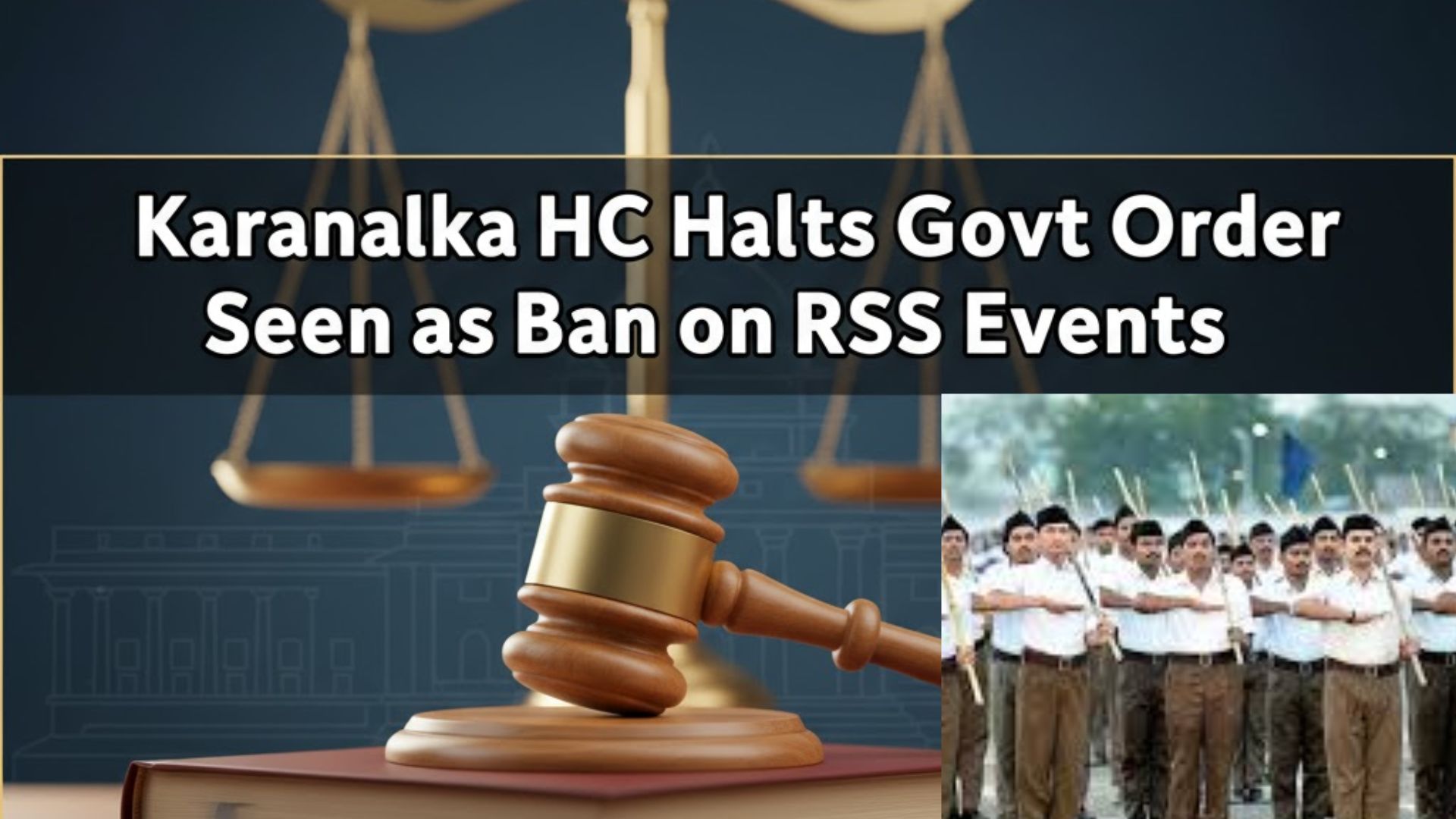
Karnataka High Court Stays Government Order Seen as Ban on RSS Activities
Court says restrictions affect fundamental rights of citizens
Interim relief comes as political battle intensifies in Karnataka
By Our Legal Reporter
New Delhi: October 28, 2025: In a major setback to the Siddaramaiah-led Karnataka government, the Dharwad Bench of the Karnataka High Court has stayed a government order that was widely interpreted as a move to ban or restrict the activities of the Rashtriya Swayamsevak Sangh (RSS) in the state.
The order, issued earlier in October 2025, required private organisations and associations to seek prior permission before holding events or gatherings in government premises. While the circular did not name the RSS directly, it was seen as targeting the organisation’s shakhas (daily meetings) and route marches.
Background of the Case
- The Karnataka government reissued a 2013 circular that prohibited the use of government school grounds and premises for non-educational purposes.
- The move came after Minister Priyank Kharge urged the Cabinet to restrict RSS activities in public spaces.
- The order made it mandatory for any private group to obtain prior permission before holding events in government-owned properties.
- Several petitions were filed, including one by Punashthen Seva Sanstha of Hubballi, challenging the legality of the order.
High Court’s Observations
Justice M. Nagaprasanna, who heard the matter, made several important points:
- Restriction on Fundamental Rights: The court said the order appeared to restrict the fundamental right to assemble peacefully under Article 19(1)(b) of the Constitution.
- Targeting Specific Groups: Though the order did not name the RSS, the court noted that its impact was clearly directed at the organisation’s activities.
- Interim Relief: The court granted an interim stay on the order until November 17, 2025, giving temporary relief to the petitioners.
- Notice to Government: The court issued notices to the Karnataka Government, Home Department, DGP, and Hubballi Police Commissioner to respond.
Political Reactions
The ruling has triggered sharp political reactions across Karnataka:
- BJP Response: The BJP hailed the decision as a victory for democracy, accusing the Congress government of trying to “suppress nationalist organisations.”
- Congress Stand: The Congress defended its move, saying the order was meant to regulate the use of government property and not specifically to ban the RSS.
- Public Debate: On social media, the issue has sparked heated debates about freedom of association, political bias, and the role of the RSS in public life.
Legal and Social Implications
- Freedom of Assembly: The case highlights the tension between state control of public spaces and the constitutional right to assemble peacefully.
- Precedent for Other States: The ruling could influence similar disputes in other states where governments attempt to regulate political or social organisations.
- Impact on RSS Activities: The stay order allows the RSS to continue its shakhas and marches without seeking prior permission, at least temporarily.
- Judicial Oversight: The case underscores the judiciary’s role in checking executive actions that may infringe on fundamental rights.
Broader Context
The controversy comes against the backdrop of the Ayodhya Ram Temple inauguration earlier this year and heightened political tensions between the BJP and Congress in Karnataka.
- The RSS, often described as the ideological parent of the BJP, has a strong presence in Karnataka.
- The Congress government’s move was seen as an attempt to curb its influence, especially in schools and public institutions.
- The High Court’s intervention has now shifted the battle from the political arena to the legal one.
Expert Views
- Constitutional Lawyers: Experts say the case will test the limits of reasonable restrictions under Article 19.
- Civil Rights Groups: Activists argue that while the state can regulate public order, blanket restrictions on organisations set a dangerous precedent.
- Political Analysts: Many see the move as part of a larger political strategy ahead of upcoming elections in Karnataka.
Conclusion
The Karnataka High Court’s decision to halt the government order is a significant legal and political development. It reinforces the principle that fundamental rights cannot be curtailed by executive orders, even when framed as administrative regulations.
As the case proceeds, it will continue to shape the debate on freedom of association, political neutrality of state institutions, and the balance between governance and rights.
ALSO READ POPULAR ARTICLES
-
Supreme Court Opens Door for Vodafone Idea Relief in AGR Case
-
Delhi High Court Rules No Alimony for Financially Independent Spouse
-
Akshay Kumar Moves NCLAT Against Edtech Firm Over ₹4.83 Cr Dispute
-
SC Quashes Chhattisgarh Tender Clause Favoring Local Bidders
-
SC to Examine Validity of Securities Transaction Tax on Trading
-
SC Defers Vodafone Idea ₹5,606 Crore AGR Dues Hearing to Oct 13
-
Punjab & Haryana HC: Bail Can’t Be Cancelled for Seeking Hearing Exemptions
-
Delhi HC Protects Mankind Pharma’s ‘Kind’ Trademark, Bars Similar Names
-
Delhi HC Appoints Justice Rajiv Shakdher as Arbitrator in Playboy Bar Dispute
-
Karisma Kapoor’s Kids Challenge Sunjay Kapur’s Will in Delhi HC
-
SC Questions Dual Madras HC Hearings, Reserves Verdict on TVK Plea
-
SC Lets Judicial Officers With 7 Years Bar Apply for District Judge
-
SC to Hear Vijay’s TVK Plea Against SIT Probe in Karur Stampede
-
SC Probes Financial Irregularities in Indiabulls Housing: ED
-
Delhi HC Quashes 22-Year-Old Case Against Lawyer Over Basement Office
-
SC Seeks Rehab Plan for Cadets Injured During Military Training
-
SC PIL Seeks CBI Probe, Nationwide Review on Cough Syrup Deaths
-
Delhi HC Hikes Land Compensation for Yamuna Project Villagers
-
Punjab & Haryana HC: Bail Can’t Be Denied Over No Permanent Home
-
SC: Appellate Courts Can Correct Trial Court Evidence Errors